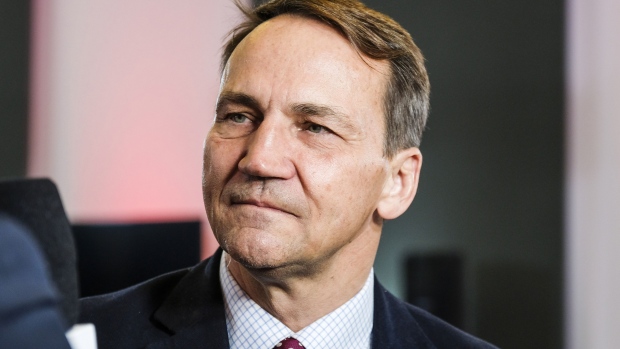Feb 26, 2024
Polish Diplomat’s Big Mouth Strikes Again and Lands a Blow on Russia
, Bloomberg News

(Bloomberg) -- Radoslaw Sikorski’s tendency to speak his mind often lands him in trouble.
But his acerbic put-down of Russia’s revanchism at a United Nations Security Council meeting on Friday has turned Poland’s foreign minister into an overnight sensation and may become a standout moment of the debate around the war in Ukraine.
Responding to Russia’s UN ambassador Vasily Nebenzya in New York, Sikorski delivered a four-minute speech aimed at “correcting the record” of the envoy’s remarks, repudiating a series of Kremlin talking points used repeatedly to justify the invasion of Ukraine, now into its third year.
He also waded into the history of Russo-Polish relations, reminding the ambassador of how the Soviet Union banded together with Nazi Germany to attack Poland in 1939, and cheekily asked whether a failed attempt by Russian troops to take Warsaw in August 1920 was “a topographic excursion.”
“The truth is that for every time Russia was invaded, she has invaded ten times,” Sikorski, 61, told the meeting. “But there’s good news. After each failure there were reforms.”
Delivered with confidence and wit, it was typical Sikorski. The speech won widespread praise, with former Swedish Prime Minister Carl Bildt calling it “a classic. Not much left of Russia after that.”
British historian Timothy Garton Ash described it as “one for the ages,” while Wolfgang Ischinger, a former German diplomat and former head of the Munich Security Conference, wrote: “Bravo Radek. We expected nothing less from you,” in a post on the X social media platform.
Sikorski’s straight talk has defined his career — and more often than not, it’s landed him in hot water, raising questions in the past about his fitness to serve as Poland’s top diplomat. While still a European Parliament lawmaker in 2022, Sikorski sparked outrage by suggesting in a post — later removed — that the US was responsible for explosions that damaged the Nord Stream 2 gas pipeline under the Baltic Sea.
On another ocassion, he compared Russia’s Nord Stream pipeline to Germany with the Molotov-Ribbentrop Pact that carved up Poland between Germany and the Soviet Union before World War II.
Such antics are reminiscent of a politician that Sikorski befriended during his time as a student at Oxford University: Boris Johnson. Both members of the private, all-male Bullingdon Club, they have stayed in touch, with the former UK prime minister visiting Sikorski’s country house in 2014 during his previous stint as Poland’s foreign minister.
Born in the northwestern Polish city of Bydgoszcz, Sikorski left for the UK to study English in June 1981, six months before Poland’s then-communist leadership imposed martial law. He then sought political asylum. His resume includes stints as a war correspondent in Afghanistan during Russia’s decade-long invasion that began in 1979, where he freelanced for British newspapers.
As a minister in several Polish governments, he rose to international fame as one of the negotiators in Kyiv in 2014, days before Ukraine’s then Russian-backed president, Viktor Yanukovych, fled the country. A camera then caught him telling opposition leaders to agree to a deal or “you’ll all be dead.”
Three years earlier, Sikorski raised eyebrows with a speech in which he said he feared Germany’s power less than German inaction, an appeal for the EU’s largest member to play a more active role in Europe.
His return to the government of Prime Minister Donald Tusk in December was always seen as controversial for a gaffe-prone minister whose wife, Pulitzer Prize-winning historian and The Atlantic staff writer Anne Applebaum, is an outspoken critic of Russia. But Sikorski’s extensive network of US contacts was seen as a plus and a springboard for a career abroad, possibly as a defense commissioner in the EU’s next executive.
Speaking in a Bloomberg Television interview in New York on Feb. 22, Sikorski warned of “profound consequences” for US alliances if Congress fails to approve more than $60 billion in proposed military assistance to Ukraine, saying that some countries may be pushed to develop their own nuclear weapons programs if US leadership comes into question.
Read more: Poland’s Sikorski Urges US to Help Ukraine or Face Dire Results
He also responded to another politician known for speaking his mind, Donald Trump, who said recently that he once told an unnamed leader that he’d encourage Russia to attack NATO countries that don’t deliver on military spending commitments.
“Poland sent a brigade to Ghazni, a tough province in Afghanistan — and we didn’t send an invoice to Washington,” Sikorski said. “A military alliance is not a neighborhood security company.”
©2024 Bloomberg L.P.


